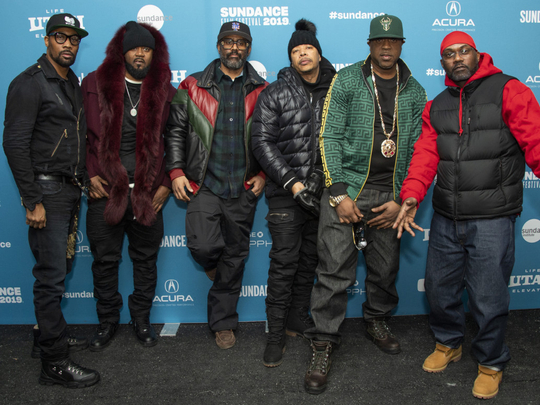
Brotherhood rules everything around the Wu-Tang Clan, who have stuck together through thick and thin, building a legacy out of more than just beats and rhymes over more than two decades.
This week at the Sundance Film Festival, Staten Island’s iconic MCs looked back at their journey from the projects to stardom and got emotional premiering two episodes of their upcoming Showtime docu-series, ‘Wu-Tang Clan: Of Mics and Men’.
“It was touching to say the least,” said RZA, joined by Ghostface Killah, U-God, Cappadonna, Masta Killa and director Sacha Jenkins at the LA Times Sundance studio. “And very emotional to flash back and see all the history of the past right in front of us.”
“It was like reliving and reminiscing on what it took to get here and the trials and tribulations and what we came through,” added Cappadonna. “We got a chance to reveal that so that the people could see a side of us that they don’t get to see in our music. That’s what made me feel good about it.”
“I cried,” said U-God. “At the same time it was like a release. Like, ‘Damn, we made it through.’”
Blending never-before-seen footage with new interviews, ‘Of Mics and Men’ delves into the group’s origins as youngsters growing up in and around Park Hill, Staten Island.
“These guys are from Staten Island, I’m from Queens, we’re all about the same age and we’ve experienced a lot of the same things,” said Jenkins. “The film opens up with this beautiful greenery and these ponds — this really idyllic beautiful kind of thing and the guys are talking about, ‘We were like the Little Rascals, we played with salamanders, we went fishing.’
“But then they say, ‘There were two ponds — there was the white boy side, and we stayed on our side.’ So you see throughout the film these systematic things that affected their youth, and you see how they coped with it. You see how young folks with very little social capital have hustle and are intelligent,” he said.
“This lotus grew out of mud,” said RZA, “but it grew into a beautiful flower.”
Over time the Wu-Tang Clan have seen America change, watched their beloved Staten Island change, and with it the fans who made them hip-hop legends.
“You look in our audience, and at first it was an all-black audience ... and as time goes on, it’s every race, creed, gender, everybody is there,” said RZA. “Change happens. But this is a big country. Three hundred million people. And you’re dealing with 400 years of an ideology, and if you just want to take it back to the civil rights [movement], maybe only 50, 60 years of a legal change.
“I think the problem is that we keep forgetting that the common thread is that we are American,” he continued. “There are only 300 million people of us, versus 8 billion people that are not us. So we’re a small fraction. For us to then subdivide ourselves again is the most foolish thing we can do as a country.
“There’s nobody in this country who cannot say that another ethnicity or race has not contributed to the greatness of this country. It took all of these people to make this become the so-called greatest country in the world. And I think we are foolish to separate [ourselves].”













